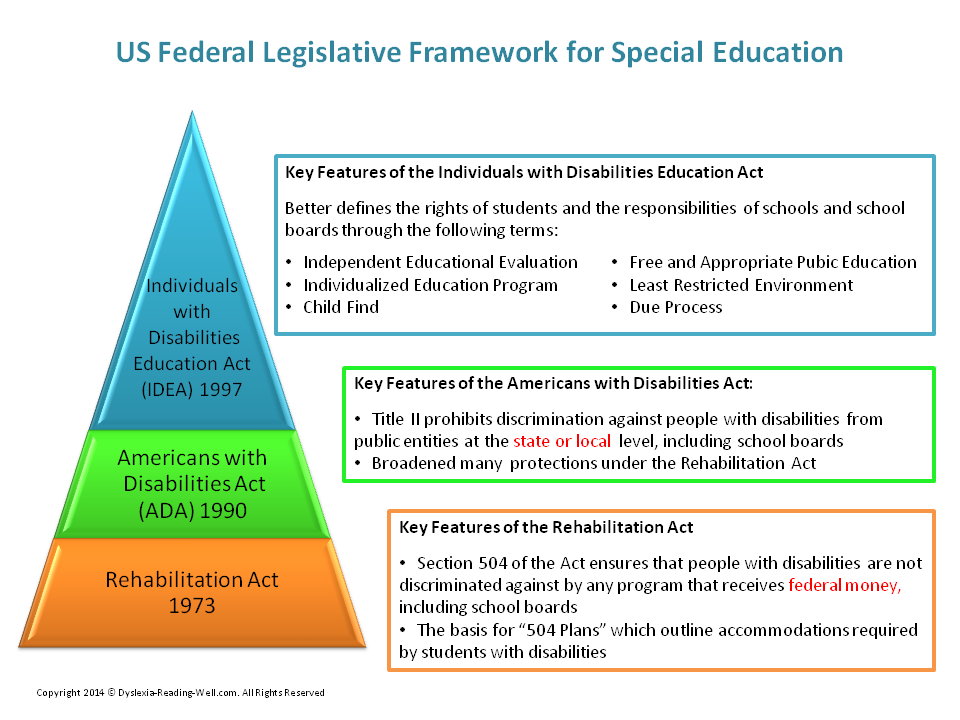U.S. Special Education Law Primer:
Dyslexic Perspectives

Quick Facts about U.S. Special Education Law
Three important federal U.S. laws support special education:
- Rehabilitation Act
- Americans with Disabilities Act
- Individuals with Disabilities Education Act
Collectively these laws help ensure that you have the right to:
- Access all educational records of your child
- Participate in all meetings about your child
- To request a free assessment if you suspect your child may have a disability
- A free and appropriate public education for your child
- An Individualized Education Program with classroom accommodations for your child if they are deemed to have one of 13 categories of disability
- Receive written notice from the school each time they propose to take (or refuse to take) actions with respect to your child
- Mediation or due process in cases of dispute with your school board
Detailed information on dyslexia related laws at the state level is available in our Parent Guide.
Note
Information provided on this page is not legal advice. If you require legal council you should seek out a qualified, licensed attorney familiar with disability and special education law.
Know what the law allows you to do
Current special education law in the United States provides parents of dyslexic children with a lot of tools to help your child get the best education possible. Unfortunately, the law can be confusing and difficult to understand and you probably don't have the time to learn every section and clause. So what to do?
Start
with the basics. Below is an overview of the three most important special education laws that dyslexic children can benefit from. And while this information can't replace a good lawyer, we hope you will find it a great starting place for learning your rights under the law - all from the dyslexic perspective.

Special Education Law Comparison Table
Section 504 Rehabilitation Act
|
ADA |
IDEA |
|
A civil rights law that prohibits discrimination on the basis of disability in any program or activity that receives federal financial assistance. |
A civil rights law that prohibits
discrimination on the basis of disability particularly in employment and public
services including education. |
An education law that provides federal financial resources to State and local education agencies to provide special education and related services to children with disabilities. |
|
Anyone with a disability in a program or activity funded by the federal government. To quality under the Act as disabled, a student must be determined to: 1) have a physical or mental impairment that substantially limits one or more major life activities; or 2) have a record of such an impairment; or 3) be regarded as having such an impairment. |
Anyone with a disability in a program or activity funded by State and local government. The definition of disability is the same as under Section 504. Note that this is a less restrictive standard than found under IDEA |
Children ages 3-21 who have been found to have a disability under one of 13 specific
disability categories and who require special education accommodation. |
|
No funding provided by Federal government but State and local jurisdictions may have to incur costs within existing budgets to ensure that eligible students are not discriminated against. |
No funding provided, but some tax credits may be
available for organizations facing expenses while making accommodations. |
IDEA receives Federal funding to assist States and local education agencies in meeting requirements under the law. |
Below is more detailed information about each of the three laws:
Rehabilitation Act 1973, 1993, 1998
Section 504 of the Rehabilitation Act
"No otherwise qualified individual with a disability in the United States... shall, solely by reason of her or his disability, be excluded from participation in, be denied the benefits of, or be subjected to discrimination under any program or activity receiving Federal financial assistance"
- Requires that
students with disabilities not be discriminated against by any program or activity receiving
federal financial assistance (includes schools)
- Originally Section 504 did not define disability but later adopted the definition in the Americans with Disabilities Act: 1) a physical or mental impairment that substantially limits one or more major life activities; or 2) a record of such an impairment; or 3) be regarded as having such an impairment
- The Act is an overarching civil rights law (much more than just a special education law) that can be used to eliminate
barriers to access for those with disabilities such as
providing ramps for students in wheel chairs and basic curriculum
or classroom modifications
- Section 504
does not require schools to provide special services to individual students at
additional costs. But within existing budgets they must provide equal opportunity for disabled students to compete when compared to non-disabled students
- For section 504 to apply to
your student, they must be between 3-21 years of age, have a documented disability AND require accommodation
Americans with Disabilities Act (ADA) 1990, 2008
|
 Then President Bush signing the ADA in 1990 |
- Amendments made in 2008 broadened some protections
found under the original version of the Act since the
courts had interpreted the Rehabilitation Act much more narrowly than congress intended
- Under
ADA, an individual with a disability is a person who: 1) has a physical or
mental impairment that substantially limits one or more major life activities;
or 2) has a record of such an impairment; or 3) is regarded as having such an
impairment
- A physical impairment is defined by ADA as
"any physiological disorder or condition, cosmetic disfigurement, or anatomical loss affecting one or more of the following body systems: neurological, musculoskeletal, special sense organs, respiratory (including speech organs), cardiovascular, reproductive, digestive, genitourinary, hemic and lymphatic, skin, and endocrine." - Note that the ADA does not list every condition that is covered although IDEA does have 13 list categories of disability
Individuals with Disabilities Education Act (IDEA) 1997, 2004
IDEA is unique among U.S. special education laws. Unlike its predecessors that only assured access and prevented discrimination against a student, IDEA is proactive in ensuring that every student with disabilities receive special education services and due process. More importantly, a bar was set in terms of what students with disabilities could expect: Free Appropriate Public Education (FAPE).
Federal funding provided under IDEA allows for individual or small group instruction, curriculum or teaching modifications, assistive technology and even physical, occupational, and speech therapy according to the unique needs of your child.
Students who previously fell through the cracks, who would not have received the intensive, professional help they needed, can now be helped. Too often it has been dyslexic students falling through those cracks. IDEA is the best line of defense to stop that from happening to your child.
Below is a summary of 6 key concepts making IDEA a real watershed in helping dyslexic kids.
1) Free and Appropriate Public Education (FAPE)
FAPE is an important concept under the Act that every parent and teacher should be familiar with. It means special education services that:
- have been provided at public expense, under public supervision and direction, and without charge
- meet the standards of the State education agency
- include an appropriate preschool, elementary school, or secondary school education in the State involved
- are provided in conformity with the individualized education program
Disability Categories
IDEA Defines 13
disability categories. Dyslexia is included under the Specific Learning Disability heading.
In
order to receive assistance under the law, a student must be identified as having
one of these disabilities AND it must adversely affect their educational
performance
2) Least Restrictive Environment
Under IDEA, students with disabilities are entitled to be educated in the Least Restrictive Environment possible,
meaning that they should be educated in the same classroom and school as
all other children to the degree possible.
3) Individualized Education Program
Under IDEA any student found to have a disability and requiring classroom accommodations must have an Individualized Education Program which is simply a written plan for your child's education prepared by a team that includes you as parent along with school officials.The IEP contains:
• A statement of current level of academic achievement and function
• Measurable annual goals, including academic and functional goals
• A description of how the child's progress toward meeting the annual goals
will be measured; and when periodic reports on the progress the child is making
toward meeting the annual goals will be provided;
• A statement of the special services and aids to be provided to the child.
• A statement of any accommodations that are necessary to measure the academic
achievement and performance of the child on State and districtwide assessments
Be
aware that your school may be as much of a barrier to a great IEP as they are a
support. Before your IEP meeting check out this helpful list of 'conversation
stoppers' and responses prepared by the National Center for Learning
Disabilities. Note that this list does not seem to appear on the new NCLD website as of Summer 2015.
4) Independent Educational Evaluation
An evaluation conducted by a qualified examiner who is not employed by the public agency responsible for the education of the child in question
5) Due Process
IDEA provides parents with formal mechanisms for resolving disputes with school boards: Mediation, Due Process Hearing and Resolution Meeting.
- Mediation involves parents and school district officials meeting along with a neutral mediator who helps both sides come to an acceptable agreement.
- A Resolution Meeting is a new process allowed under amendments to IDEA made in 2004. The Due Process complaint is discussed prior to the formal hearing in hopes of early resolution.
- An impartial due process hearing is a formal meeting between parents and the local school district where each side presents its case and a hearing officer decides what the appropriate educational program is, based on requirements in law.
6) Child Find
IDEA requires all school districts to identify, locate and evaluate all children with disabilities, regardless of the severity of their disabilities even if the school is not providing special education services to the child.
Under the law,
every state must develop and implement a practical method of determining which
children with disabilities are receiving special education and related services
and which children are not. In theory this should take pressure off parents for recommending their child for assessment, but don't count on the school to identify your child. If you suspect a problem, ask for an evaluation!
Final thoughts on the special education law framework
Collectively these three special education laws put a lot of power into the hands of parents with dyslexic children.
It's essential that you understand your basic rights under these laws so that you can communicate with your school district from an informed position. If you suspect a disability, request an assessment. If you are not happy with it request an independent educational evaluation, be involved in the IEP process, request accommodations your child needs and if necessary seek mediation or due process, because these aren't just good for you child, they are your rights! If absolutely necessary be sure to seek out a licensed attorney for legal help.
As a Canadian I envy the clear rights, responsibilities and terminology spelled out under U.S. special education law. By comparison Canada has a hodgepodge of provincial laws and regulations to confuse just about everyone. So be sure to take advantage of these hard won privileges to ensure the best possible education for your child!
Good luck and good reading!
Return to the top of Special Education Law
- Home ›
- Special Education Law
New! Comments
Share your thoughts or ideas! Leave us a comment in the box below. You can post it at this site only or on Facebook too, it's up to you.